By A Mirsab, TwoCircles.net
Aurangabad (Maharashtra): “Thodi si neki karle pyare …Allah ne mauka diya hai” (Do some good work dear …Almighty has given you an opportunity). This is the belief that powers 38-year-old Yusuf Mukati in helping impoverished families of the city in a holistic manner.
In 2014, Yusuf Mukati established Haroon Mukati Islamic Centre (HMIC), named after his late father at the busy Jinsi-Baijipura Road in the heart of Aurangabad with an intention of helping Muslims in the area, many of whom suffer from economic and other social problems.
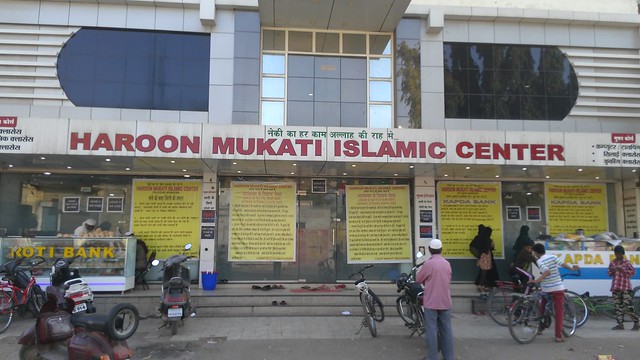
Initially, the Centre offered various free educational and vocational courses such as Arabic, Islamic tuition, mehndi and beautician courses, computer and typing class, spoken English, cooking, sewing and calligraphy classes. In addition to this, the Centre also set up a free marriage bureau.
“My father was a devoted Muslim who used to help needy people at his individual capacity. I had a desire to continue his work but at on a larger scale. So, I opened this Centre with an aim to impart free coaching in various fields so that needy people, especially girls & women can be provided with skill using which they can earn at their doorstep or find employment”, Mukati says with smile on his face.
Mukati, who runs a garment business along with his realty consultancy firm, employed some teachers for each course and paid their salary through his own pocket.
Talking about the Centre’s success, Mukati says, “Within a year, around 21,510 people obtained coaching in various fields. Many have now found a means of earning through the skill they acquired during the three-month course”.
Roti Bank
Encouraged by the response to the Centre, Mukati decided to extend help to the more marginalised sections of the society. He came up with the idea of collecting two ‘rotis’ (breads) and little ‘sabji’ (cooked vegetable) from people and distribute it in packets such food to beggars and needy people.
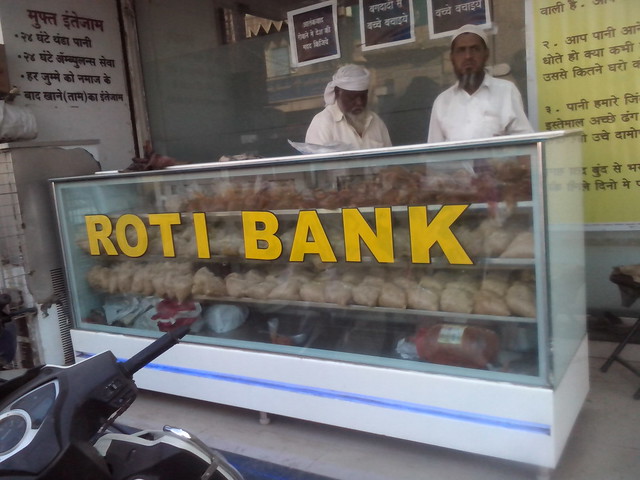
For this, he installed a counter ‘Roti Bank’ outside the Centre in December 2015 and called people to send surplus food. He distributed membership forms to the people who were willing to deposit minimal food to the Centre every day.
“After discussing the idea of Roti Bank with my wife and sisters, we went public with a modest 250 ‘depositors’ on December 14. Now we have 700 members who send food everyday to the Centre”, a joyous Mukati says while showing a membership form.
The Centre provides special carry bags with a code number to each ‘depositor’ on receipt. It is checked for freshness and quality before distribution to the needy people.
“As the work of Roti Bank spread, we started to receive phone calls from wedding parties offering extra food left over due to guest absenteeism and our deposit increased”, Mukati says.
The Roti bank runs from 11am till 9 pm. During these hours, people can deposit food, while poor people can collect their share from the bank.
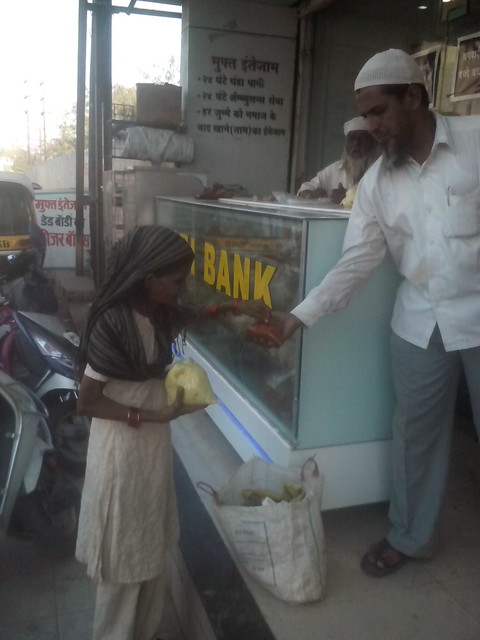
“I fill plastic bags with gravy, vegetables, rice, rotis in different bags and hand it over to the poor people when they come to the Bank”, says 60-year- old Shaikh Habeeb Chacha, who is employed by Centre.
Once the Roti Bank gained admiration from the society, there was an increase in deposits, while some even helped by offering free service at the Centre.
“I received many congratulatory calls and people offered donation but I declined to accept donation and asked them to pray for success of the Centre”, Mukati says.
The Centre’s work saw people from other walks of life contribute in their own ways too. The auto union leader of Baijipura, Asif Khan, offered help in bringing food from ceremonies or hotels which called for depositing food.
“At weddings and other ceremonies, the caterers are ready to give away the remaining food and phone the Centre to collect food. So, one of the 60-odd members of the auto union would help the Centre’s volunteers in bringing food to the bank,” he says.
Kapda Bank
If there is one consistent theme in the work of Mukati, it is the constant innovation that he seeks in ensuring that his work has the maximum reach possible. This explains why the overwhelming response shown by the people in contribution to the Roti Bank lead to Mukati opening a ‘Kapda Bank’ outside the Centre.
Mukati explains why he started the Kapda Bank. “When I was at the centre, I saw many people, especially elders and children who come to collect food at Roti Bank, shivering in the cold as they were wearing torn or inadequate clothes. This gave me the idea of installing a Kapda Bank”.
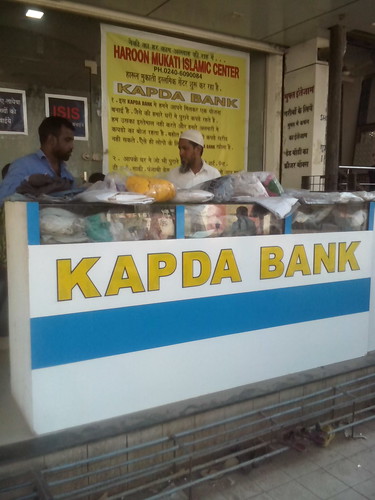
The response for Kapda Bank eclipsed that to the Roti Bank. Within two days of telling the community about the idea of the ‘Kapda Bank’ at the Centre, he got a deposit of around 600 full sets of clothes and on January 26 2016, the ‘Kapda Bank’ was started.
Talking about the way this Bank works, Mukati says, “All clothes received are examined for any wear/tears, missing buttons, hooks, loose stitching, segregated according to size and gender and then sent for dry-cleaning and ironing before being distributed to the needy people coming to the Bank.”
Marriage Bureau
The Centre also runs a free marriage bureau since its inception, which has helped arrange for 300 marriages so far.
“We help parents with the first meeting and do not charge any fees. We also advice them against dowry and ask them to conduct simple weddings,” says Seema Shalimar, sister of Mukati who runs the marriage bureau.
Mukati now wants to extend this project too and plans to help poor families by providing all necessities for collective marriages.
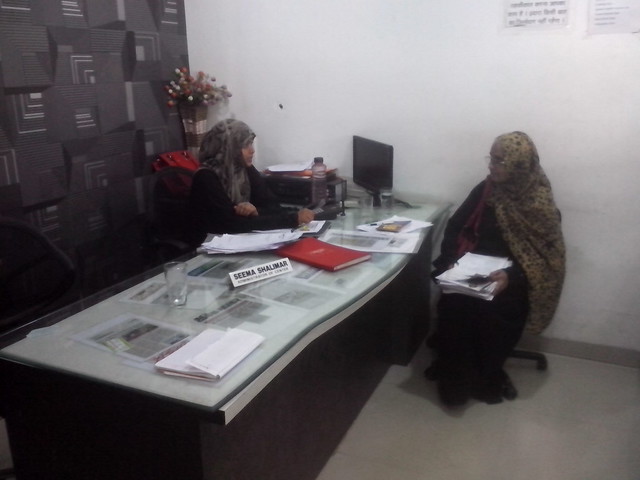
“We have started a new project under name ‘Chai pe Shadi’ where we will help poor parents in marrying their girls without charging anything from them. The idea is to save such parents from taking loans required for marriage, especially in the case of girls”, he says.
Free Coaching classes
The Centre has three halls in at the ground floor in addition to office. One hall is utilised by new comers, whereas the other two halls are used for computer and calligraphy classes.
Two more halls at the upper floor are engaged for sewing, cooking and beautician classes. Spoken English and Arabic classes are also held in a shift. In addition to this, the Centre has two Aalims (Islamic scholars) who provide the basic teachings of Islam and Quran reading to boys.
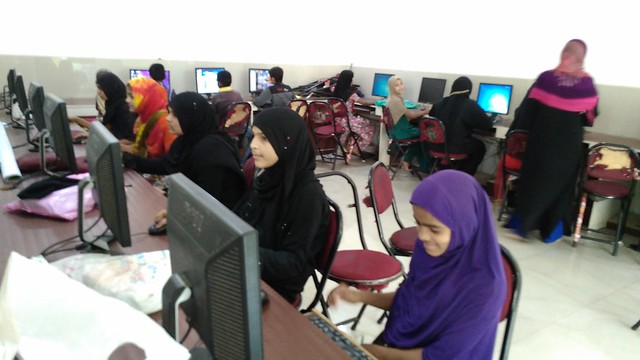
Talking about the size of the operations, Farhana Khan, 29, a facilitator at the Centre says, “We have 16 teachers here who teach in shifts. Around 2,000 people are trained here every day in different skills.”
“The best thing of the Centre is that it is being utilised by truly needy people. There are widows and divorcees who are attending sewing classes here. After a three-month course here, they will be confident enough to sew cloths and can earn their livelihood”, tells Farhana Khan.
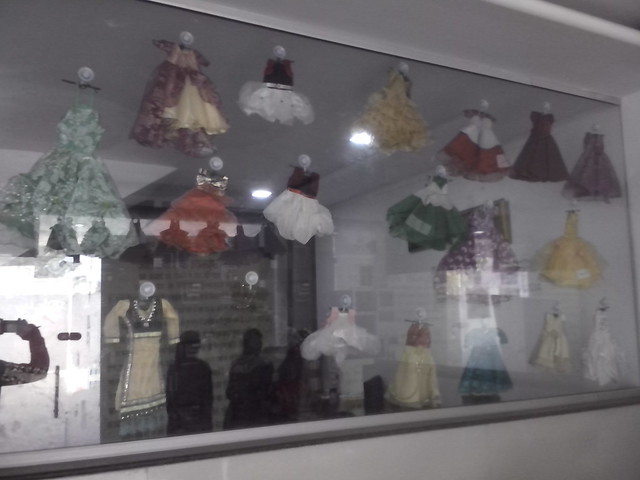
She also adds that the Centre’s help extends to non-Muslims also, who form 20% of the people trained here.
Renuka Lonkar, 25, completed B.Com and joined the Centre for training in ‘Tally and DTP work’. Sharing her experience, she told Twocircles.net, “It is a wonderful institution that charges no money and provides training in a highly compassionate environment.”
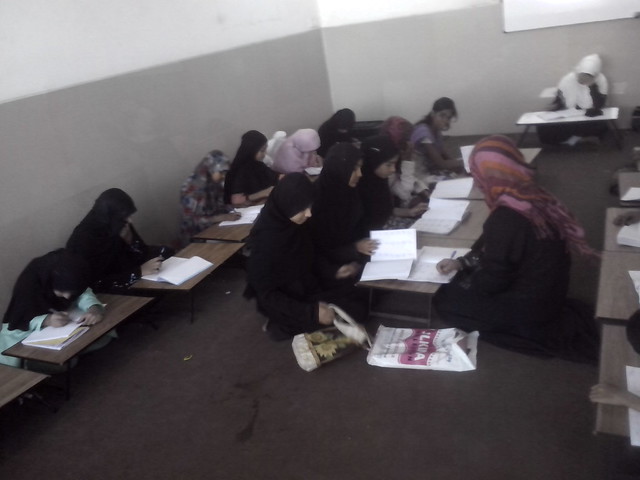
Mirza Zohra, 28, who is a ladies tailor, joined the Centre to learn more designing techniques. She says, “Initially I doubted the purpose of the Centre but when I visited it, I enrolled my name without any doubt. The Centre is helping me master the art of designing.”
“I have been coming to the Centre for the past one month for the Mehndi course and I am very happy that I can do so without paying a fee. Everyone, including the teachers here, are very supportive”, says 17-year-old Reena Rachurye.
Nazia Tarannum, 30, who could study only till Matriculation, joined the Centre to acquire sewing skills. She is also learning calligraphy at the Centre and says, “Here, the environment is very good and the students are respected. Such an environment has increased my interest to learn here”.
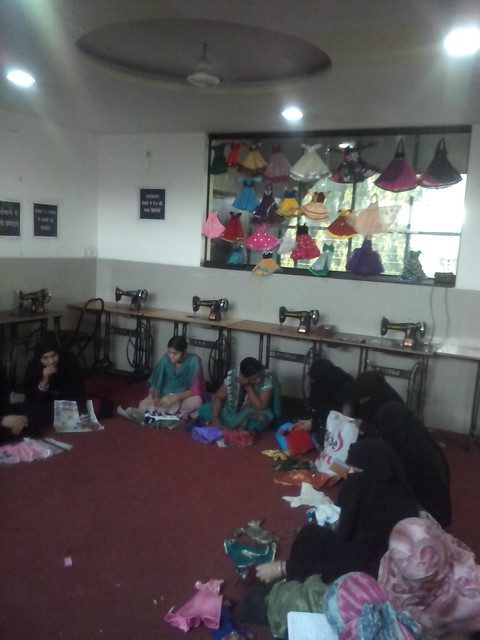
(As per Farhana Khan, Farzana Shaikh (35) and Seema Khan (30)–two widows learning in the first batch of sewing classes– were not available for comments.)
“These training centres equip young girls with a capacity to earn a livelihood, so that in case of any future problems they will have skill to ensure that they do not starve,” Mukati says.
Related:

